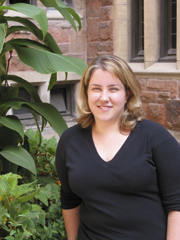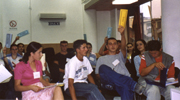
 |

|
|
 |
|
|
|||
 Student Catherine Letendre Photo by Luke Andrews  Communication progressed over the week as Kosovo youth picked up the art of UN diplomacy and negotiation. Photo courtesy of Catherine Letendre |
by Carol McQueen As Canada’s United Nations Association Regional Coordinator for Model UN activities in the province of Quebec, Catherine Letendre gave her usual talks at a series of workshops on how to run a Model UN conference, how to research a country’s position on a particular topic, and how to negotiate UN resolutions. Only this time, there were armed Italian NATO peacekeepers at the back of the room. A Concordia political science and economics student, Letendre was in Kosovo in June as part of a UN Mission in Kosovo (UNMIK) and Organization for Security and Cooperation in Europe (OSCE) initiative to bring Model UN activities to the youth of Kosovo. The internationally-administered province is still recovering from the 1999 civil war that led to massive ethnic cleansing and eventual NATO military intervention on behalf of the ethnic Albanians. “The basic goal of the program was to get the high school students interested in the Model UN as a means to facilitate communication between different ethnic groups,” said Letendre, adding that most Serbs and Albanians in Kosovo have had no contact with each since the war. “The hope was to get them talking outside of the context of the war, and not talking about genocide, but talking in this case about AIDS,” which was the theme of the Model UN conference. Through interaction over the course of the week, the students began to see, according to Letendre, that “though they might be Serbian, Albanian or Bosnian, they were all the same age and had the same interests, and were not so different from each other and should not be sworn enemies.” But contact, let alone understanding, between the different ethnic groups, was not easy to achieve. Of the 45 students who attended the Kosovo Model UN, only four were Serbs. They had to be escorted to and from their enclaves by military escort, and were required to remain under NATO protection throughout the conference. The Serbs were not permitted to move about freely during the Model UN or to step outside the conference room for fear of the possibility of violence against them. They also tended to stay together, mainly due to the language barrier. “The Serbs didn’t understand Albanian, and the Albanians who knew the Serbian language didn’t want to use it, because they viewed it as a language of oppression.” Albanians had not been allowed to speak their own language in the streets during Slobodan Milosevic’s reign. Yet, according to Letendre, there was a slight thawing out between the groups as the week progressed. “You could see that when the negotiations were taking place — as they were engaging in Model UN activities — the Serbs were integrating into the circle and entering the negotiations process as the countries they were representing.” Although discord between participants could not be overcome entirely, the Model UN initiative was very successful from the point of view of educational reform. A top priority for the new Kosovo government is to revamp and modernize their educational system to make it relevant and enjoyable to young people in Kosovo. Letendre’s aim was to help build the infrastructure that would enable Model UN activities to take root in Kosovo, so that research, public speaking and negotiating skills could form part of the average high school curriculum. The OSCE and UNMIK are slowly facilitating the development of a Kosovo province-wide Model UN network. Largely through funding by the U.S. State Department, several Kosovar students will be flown to Canada to attend a Model UN conference in March 2003. Besides educational reform, another main aim of the Model UN project was to give the youth of Kosovo a chance to see that diplomatic negotiation and compromise are far preferable to ethnic conflict as a means to resolve differences. Asked whether or not student involvement in Model UN activities might increase the chances of a lasting peace in Kosovo, Letendre said that “it can’t necessarily prevent future conflict, but it can be helpful.” For more information on the Canadian UN Association, see www.unac.org. For information on Concordia’s very active Model UN group, see http://www.conmun.org/. |